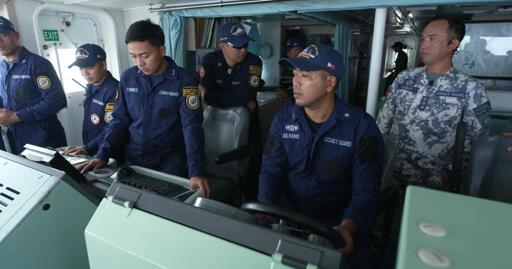An escalating series of clashes in the South China Sea between the Philippines and China could draw the U.S., which has a mutual defense treaty with the Philippines, into the conflict.
A 60 Minutes crew got a close look at the tense situation when traveling on a Philippine Coast Guard ship that was rammed by the Chinese Coast Guard.
China has repeatedly rammed Philippine ships and blasted them with water cannons over the last two years. There are ongoing conversations between Washington and Manila about which scenarios would trigger U.S. involvement, Philippine Secretary of National Defense Gilberto Teodoro said in an interview.
“I really don’t know the end state,” Teodoro said. “All I know is that we cannot let them get away with what they’re doing.”
China as “the proverbial schoolyard bully”
China claims sovereignty over almost all of the South China Sea, through which more than $3 trillion in goods flow annually. But in 2016, an international tribunal at the Hague ruled the Philippines has exclusive economic rights in a 200-mile zone that includes the area where the ship with the 60 Minutes team on board got rammed.
China does not recognize the international tribunal’s ruling.



Why are they attempting to expand their territorial waters?
It’s about expanding their ability to project naval power in general, but more specifically, trying to to build effective defensive counters against potential future naval blockades and maritime containment e.g. Island Chain Strategy
That’s oversimplified, and there are other aspects to it, including domestic political cultural ones, but naval power and national security is the most significant.
I am not taking any position on justification, legal standing, or strategic prudence for this strategy.
There are any number of white papers, from both Chinese and American security organizations/think-tanks, that will cover the subject in much greater depth if you’re interested.
That sounds like a lot of words to say capitalism.
Are you saying that national security strategies, and war in general, didn’t appear in this world until capitalism emerged?
I’m saying that those stratigies are being executed to support their capitalist ambitions. You need freedom of the seas to ensure trade and they’re enhancing their power projection capabilities to ensure they’ll be free to continue trading in the event of forgein interfere.
It’s the exact same reason the United States enacts similar “national security strategies”.
That statement is so incredibly wrong in this particular context that it’s actually impressive.
Well, maybe not impressive, but it does show off your ability to speak authoritatively on a topic that you know absolutely nothing about, except of course for your firm conviction that capitalism is clearly the only thing motivating it all.
People understand the importance of the Malacca straight, Taiwan, and the various islands in that region. It’s the same reason Japan rapidly expanded into that region during WW2, bringing unimaginable suffering to the people in that region.
Maybe you aren’t making this point, and sorry if you aren’t, but that strategic interest does not give China the right to illegally sieze territory to suit itself. That is imperaliam. That is what Russia is doing in Ukraine and it is absolutely wrong.
Why does China not try to make allies in the region
The modern context of Japanese and Chinese expansionism in this particular area is similar in some ways, but very different in other ways.
Regardless, I agree that China doesn’t have the legal right to seize territory, but that doesn’t mean I shouldn’t understand their perspective.
It also doesn’t make the idiotic reductionist take that this is all “capitalism”, any less idiotic.
All that said, I also understand that great powers tend to only talk about international law when they are applying it to countries they view as beneath them, or inferior.
In this case, China is coming into its own as a regional hegemon, assuming their relatively new status as an outright dictatorship doesn’t fuck that up. To do that, it has to push out American naval power, there’s no alternative for them.
So, if Xi’s one man politburo figures out how to walk and chew gum, while also driving a successful regional expansion, I don’t think yours, or my, quibbles about international law will make much difference.
Luckily, whether he’s capable of juggling all that successfully, is still an open question with a lot of doubt.
China has been an outright dictatorship for a while now, it’s just the lifetime leader that was recent.